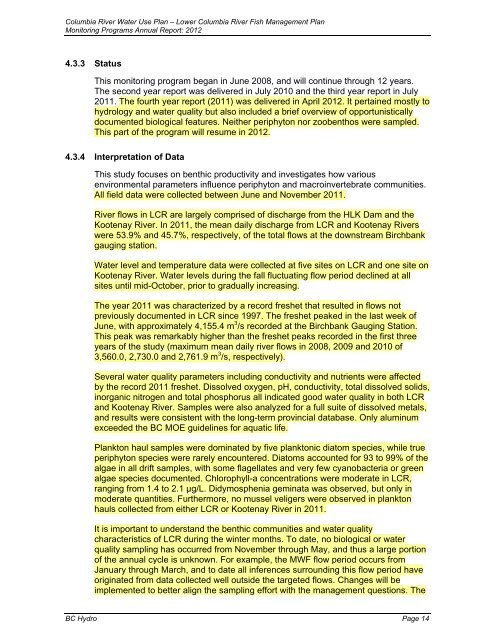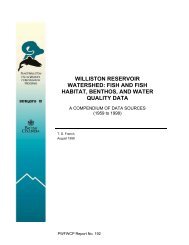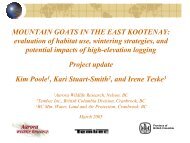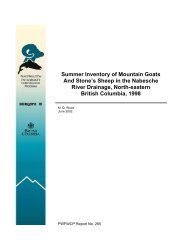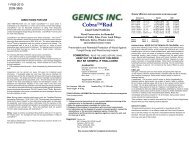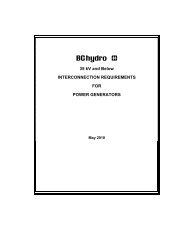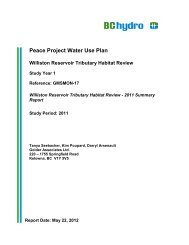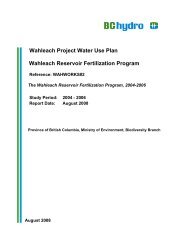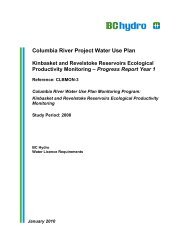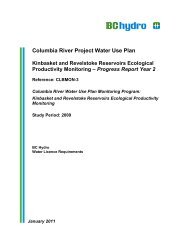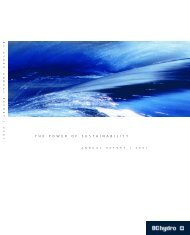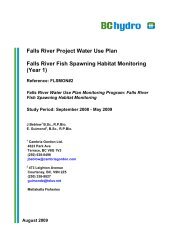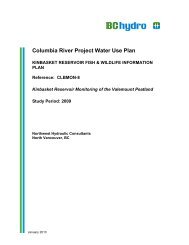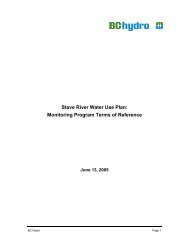August 201 - BC Hydro
August 201 - BC Hydro
August 201 - BC Hydro
You also want an ePaper? Increase the reach of your titles
YUMPU automatically turns print PDFs into web optimized ePapers that Google loves.
Columbia River Water Use Plan – Lower Columbia River Fish Management Plan<br />
Monitoring Programs Annual Report: <strong>201</strong>2<br />
4.3.3 Status<br />
This monitoring program began in June 2008, and will continue through 12 years.<br />
The second year report was delivered in July <strong>201</strong>0 and the third year report in July<br />
<strong>201</strong>1. The fourth year report (<strong>201</strong>1) was delivered in April <strong>201</strong>2. It pertained mostly to<br />
hydrology and water quality but also included a brief overview of opportunistically<br />
documented biological features. Neither periphyton nor zoobenthos were sampled.<br />
This part of the program will resume in <strong>201</strong>2.<br />
4.3.4 Interpretation of Data<br />
This study focuses on benthic productivity and investigates how various<br />
environmental parameters influence periphyton and macroinvertebrate communities.<br />
All field data were collected between June and November <strong>201</strong>1.<br />
River flows in LCR are largely comprised of discharge from the HLK Dam and the<br />
Kootenay River. In <strong>201</strong>1, the mean daily discharge from LCR and Kootenay Rivers<br />
were 53.9% and 45.7%, respectively, of the total flows at the downstream Birchbank<br />
gauging station.<br />
Water level and temperature data were collected at five sites on LCR and one site on<br />
Kootenay River. Water levels during the fall fluctuating flow period declined at all<br />
sites until mid-October, prior to gradually increasing.<br />
The year <strong>201</strong>1 was characterized by a record freshet that resulted in flows not<br />
previously documented in LCR since 1997. The freshet peaked in the last week of<br />
June, with approximately 4,155.4 m 3 /s recorded at the Birchbank Gauging Station.<br />
This peak was remarkably higher than the freshet peaks recorded in the first three<br />
years of the study (maximum mean daily river flows in 2008, 2009 and <strong>201</strong>0 of<br />
3,560.0, 2,730.0 and 2,761.9 m 3 /s, respectively).<br />
Several water quality parameters including conductivity and nutrients were affected<br />
by the record <strong>201</strong>1 freshet. Dissolved oxygen, pH, conductivity, total dissolved solids,<br />
inorganic nitrogen and total phosphorus all indicated good water quality in both LCR<br />
and Kootenay River. Samples were also analyzed for a full suite of dissolved metals,<br />
and results were consistent with the long-term provincial database. Only aluminum<br />
exceeded the <strong>BC</strong> MOE guidelines for aquatic life.<br />
Plankton haul samples were dominated by five planktonic diatom species, while true<br />
periphyton species were rarely encountered. Diatoms accounted for 93 to 99% of the<br />
algae in all drift samples, with some flagellates and very few cyanobacteria or green<br />
algae species documented. Chlorophyll-a concentrations were moderate in LCR,<br />
ranging from 1.4 to 2.1 µg/L. Didymosphenia geminata was observed, but only in<br />
moderate quantities. Furthermore, no mussel veligers were observed in plankton<br />
hauls collected from either LCR or Kootenay River in <strong>201</strong>1.<br />
It is important to understand the benthic communities and water quality<br />
characteristics of LCR during the winter months. To date, no biological or water<br />
quality sampling has occurred from November through May, and thus a large portion<br />
of the annual cycle is unknown. For example, the MWF flow period occurs from<br />
January through March, and to date all inferences surrounding this flow period have<br />
originated from data collected well outside the targeted flows. Changes will be<br />
implemented to better align the sampling effort with the management questions. The<br />
<strong>BC</strong> <strong>Hydro</strong> Page 14


